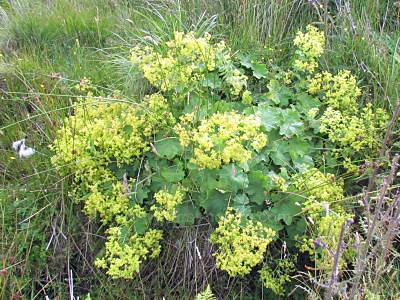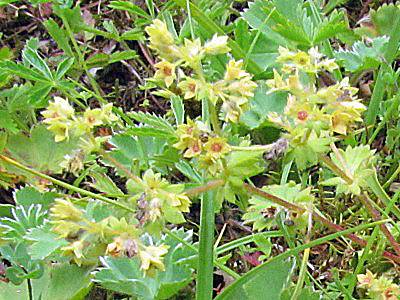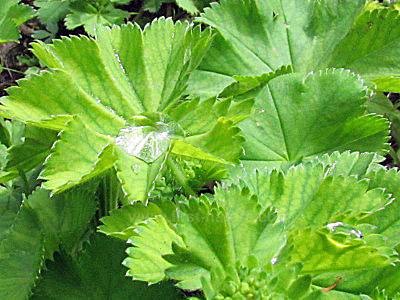Alchemilla vulgaris - Lady's Mantle
Phylum: Magnoliophyta - Class: Equisetopsida - Order: Apiales - Family: Rosaceae

More than 200 microspecies of Alchemilla vulgaris are known to exist in Europe. These perennial wildflowers, members of the rose family, are sometimes grown in gardens - mainly for their leaves, which collect sparkling water droplets.
Description
The distinctively corrugated and lobed (5 to 11 lobes with the upper leaves having fewer) kidney-shaped to semicircular leaves of Alchemilla make identification to genus level fairly straightforward.
The yellowish-green flowers form clusters. Each individual flower is typically 3mm in diameter, with no true petals but a four-lobed epicalyx, four sepals and usually four but sometimes five stamens.
Distribution
Alchemilla vulgaris is widespread and common throughout Britain and Ireland; it is also found throughout mainland Europe. This plant is also recorded as occurring in Greenland.

Habitat
Lady's Mantle is commonly seen in unimproved or lightly fertilised grassland, on roadside verges and banks, in chalk downland and on mountain slopes.
Blooming Times
In Britain and Ireland the tiny flowers of Alchemilla vulgaris can be seen from June through to September.
Similar Species
Alchemilla mollis, a rather larger species but otherwise very similar, is quite a common garden escape that sometimes appears in hedgerows and on unkempt grassland.
Uses
Lady's Mantle, which contains salicylic acid, has sedative properties and has been used to alleviate cramps and menstruation pains.

Another traditional use of this plant is as an astringent; it contains tannin and has styptic properties. In the past the leaves were used to dress wounds, rather as Stachys species (woundworts) were. (We strongly advise against eating or using as medicines any plants without first obtaining qualified professional advice.)
Etymology
Alchemilla, the genus name, denotes a plant valued for its use in alchemy. The specific epithet vulgaris means common.
The Lady's Mantle specimens shown on this page were photographed in Scotland and in Slovenia during June.
Sue Parker's latest ebook is a revised and enlarged edition of Wild Orchids in The Burren. Full details here...
Buy it for just £5.95 on Amazon...
Please Help Us: If you have found this information interesting and useful, please consider helping to keep First Nature online by making a small donation towards the web hosting and internet costs.
Any donations over and above the essential running costs will help support the conservation work of Plantlife, the Rivers Trust and charitable botanic gardens - as do author royalties and publisher proceeds from books by Pat and Sue.

